The right .NET developers are fundamental in building and maintaining robust applications for various business needs. They ensure the seamless integration of software applications with diverse systems and databases.
.NET development skills encompass a range of technologies including expertise in C#, .NET Framework, and .NET Core, along with essential skills like problem-solving and effective communication.
Candidates can write these abilities in their resumes, but you can’t verify them without on-the-job Net Developer skill tests.
In this post, we will explore 8 essential Net Developer skills, 9 secondary skills and how to assess them so you can make informed hiring decisions.
Table of contents
8 fundamental Net Developer skills and traits
The best skills for Net Developers include C Sharp Proficiency, ASP.NET MVC, Entity Framework, SQL Server, API Development, Version Control, Debugging and Unit Testing.
Let’s dive into the details by examining the 8 essential skills of a Net Developer.
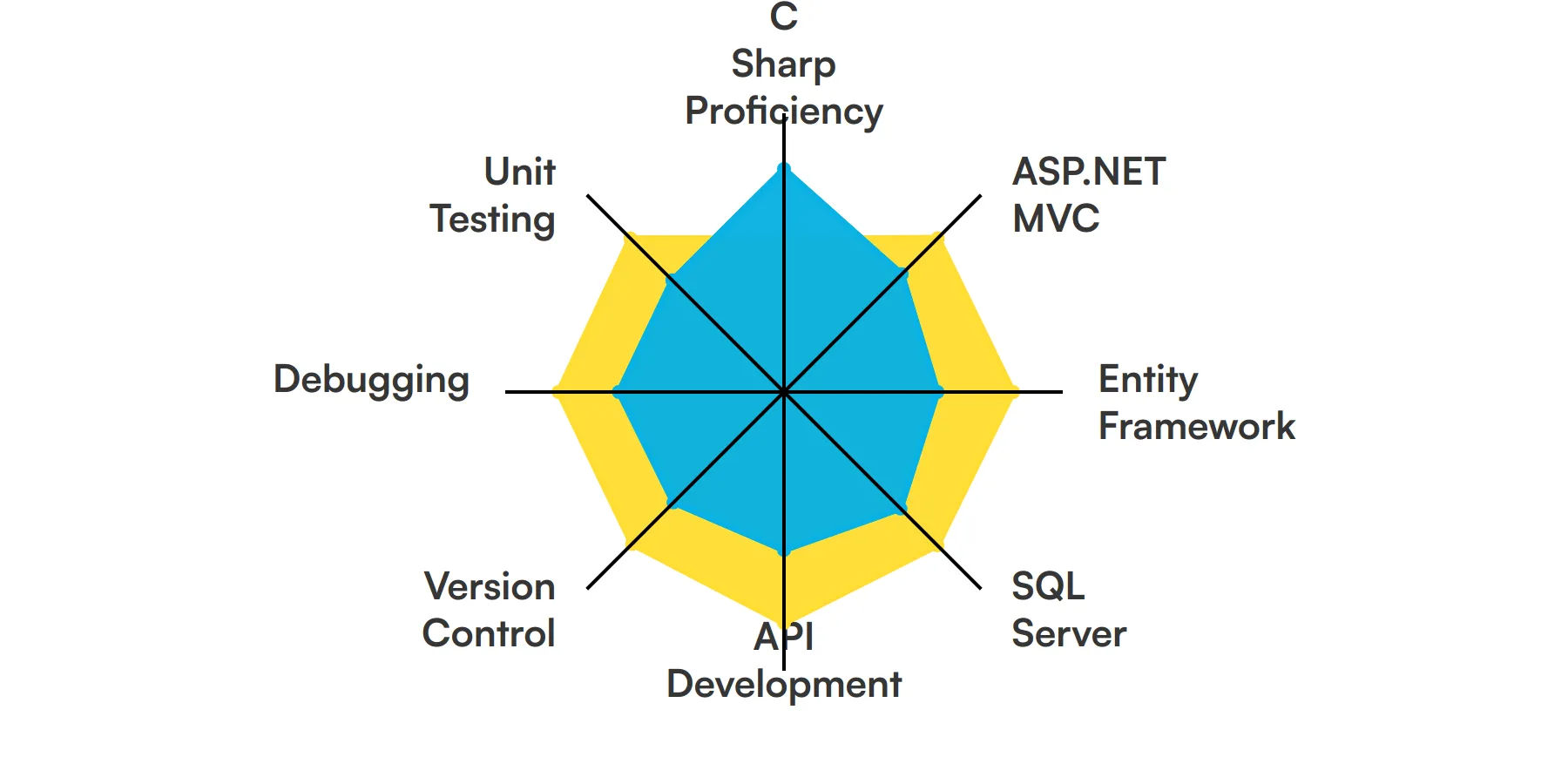
C Sharp Proficiency
As a .NET developer, mastering C# is imperative since it's the primary language used for building applications on the .NET framework. This skill involves understanding syntax, control flow, and advanced features like LINQ and asynchronous programming which are crucial for developing efficient and scalable applications.
For more insights, check out our guide to writing a C# Developer Job Description.
ASP.NET MVC
Understanding ASP.NET MVC is essential for .NET developers working on web applications. This skill allows developers to design robust web applications with a clear separation of concerns, enhancing testability and maintainability. It involves working with models, views, and controllers, a pattern that helps in managing complex applications.
Entity Framework
Entity Framework is a popular ORM used by .NET developers to work with databases using .NET objects. It's important for handling data access smoothly and efficiently, reducing the amount of boilerplate code and making it easier to maintain data-driven applications.
Check out our guide for a comprehensive list of interview questions.
SQL Server
Proficiency in SQL Server is crucial for .NET developers as it is one of the most commonly used databases with .NET applications. This skill involves designing databases, writing queries, and optimizing performance to ensure responsive applications.
API Development
API development skills are necessary for .NET developers to enable applications to interact with other systems and services seamlessly. This involves understanding REST principles, data serialization, and security practices to build efficient and secure APIs.
Version Control
Familiarity with version control, especially Git, is necessary for maintaining the integrity and history of the application code. It supports collaboration, allowing multiple developers to work on a project simultaneously without conflicts.
Debugging
Debugging is a critical skill for .NET developers to identify and fix bugs in applications. This involves using tools like Visual Studio debugger to inspect code, understand the state of the application, and resolve issues quickly and effectively.
Unit Testing
Unit testing ensures that individual parts of the application work as expected. .NET developers use frameworks like NUnit or xUnit to write tests that help maintain code quality and facilitate changes without breaking functionality.
9 secondary Net Developer skills and traits
The best skills for Net Developers include JavaScript, Azure, Agile Methodologies, Design Patterns, SignalR, Blazor, Microservices, Docker and Continuous Integration.
Let’s dive into the details by examining the 9 secondary skills of a Net Developer.
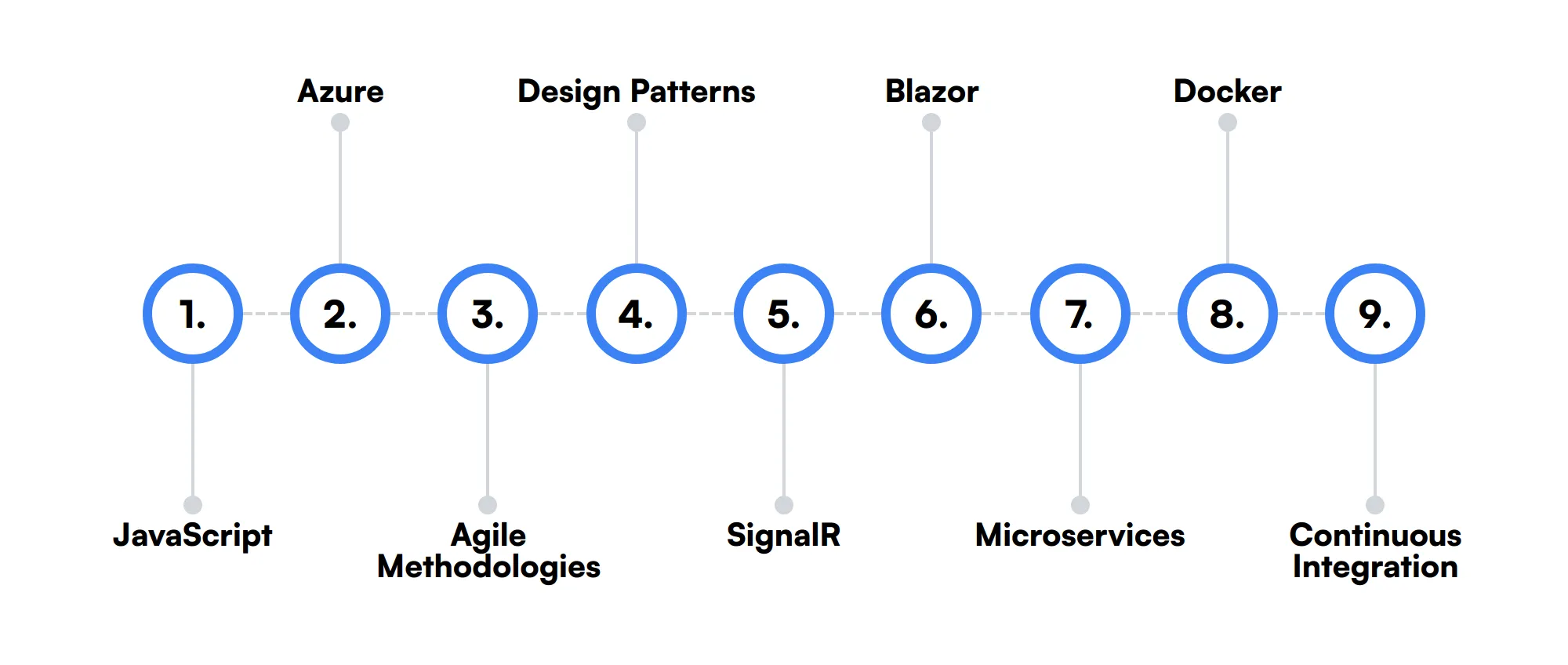
JavaScript
Knowledge of JavaScript and frameworks like Angular or React can be beneficial for .NET developers, especially when working on front-end components of web applications.
Azure
Experience with cloud platforms like Azure enhances a .NET developer's ability to deploy, manage, and scale applications. It involves understanding cloud services and how they can be integrated with .NET applications.
Agile Methodologies
Understanding Agile methodologies is useful for .NET developers as it helps in adapting to changes quickly and delivering work in manageable increments.
Design Patterns
Knowledge of design patterns enables .NET developers to solve common design issues more efficiently. This skill helps in creating a more structured and manageable codebase.
SignalR
SignalR is a library for adding real-time web functionality to applications. .NET developers use it to enable server-side code to push content to clients instantly.
Blazor
Blazor is a newer .NET framework that allows developers to build interactive web UIs using C# instead of JavaScript. This is becoming increasingly relevant as the framework gains popularity.
Microservices
Understanding the architecture of microservices is beneficial for .NET developers involved in building scalable and flexible systems. It involves developing small, independent services that work together.
Docker
Familiarity with Docker can be advantageous for .NET developers for containerizing applications, ensuring consistency across environments and facilitating easier deployments.
Continuous Integration
Skills in continuous integration tools like Jenkins or TeamCity help .NET developers automate the testing and deployment of their applications, increasing development speed and reducing manual errors.
How to assess Net Developer skills and traits
Assessing the skills and traits of a .NET Developer can be a challenging task, given the wide range of technical proficiencies required. From C# proficiency to API development, a .NET Developer must possess a diverse set of skills to excel in their role. But how do you ensure that a candidate not only lists these skills on their resume but also demonstrates them effectively in practice?
Traditional resumes and interviews often fall short in providing a comprehensive view of a candidate's abilities. This is where skills-based assessments come into play. By leveraging tools like Adaface on-the-job skill tests, you can gain a clearer understanding of a candidate's competencies, leading to a 2x improved quality of hires. These assessments can cover a range of key skills such as ASP.NET MVC, Entity Framework, SQL Server, version control, debugging, and unit testing.
Let’s look at how to assess Net Developer skills with these 6 talent assessments.
C# Online Test
Our C# Online Test evaluates a candidate's proficiency in C# programming, covering basics, object-oriented programming, error handling, and multithreading.
The test assesses understanding of C# basics, OOP concepts, error handling, and design patterns. It challenges candidates to apply these concepts in coding and multiple-choice questions.
Successful candidates demonstrate their ability to write clean, scalable C# code and effectively manage memory and resources in complex applications.
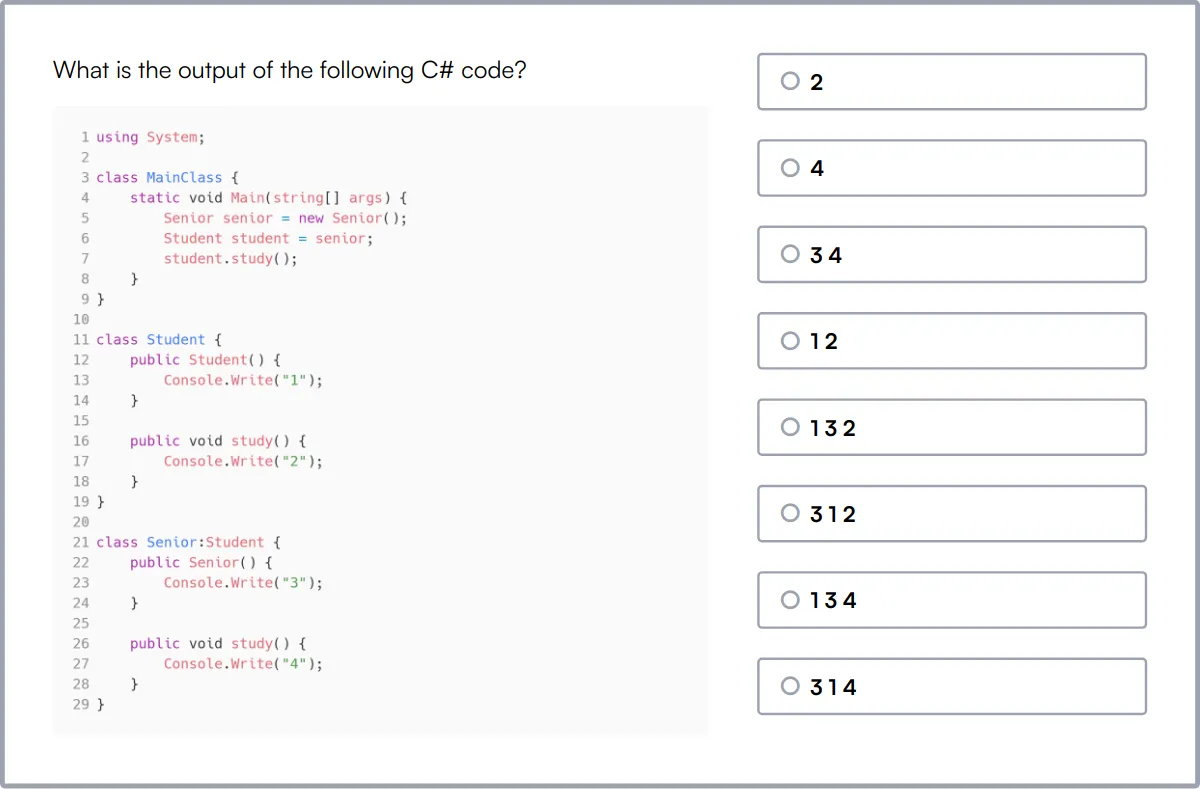
Asp.Net MVC Online Test
Our Asp.Net MVC Online Test measures candidates' skills in the Asp.Net MVC framework, focusing on web application development using C#, JavaScript, and the Razor view engine.
This test evaluates proficiency in MVC architecture, including routing, models, views, controllers, and data binding. It also tests knowledge of Entity Framework and debugging techniques.
Candidates who perform well can design and develop efficient, maintainable web applications using Asp.Net MVC, demonstrating a strong grasp of both front-end and back-end technologies.
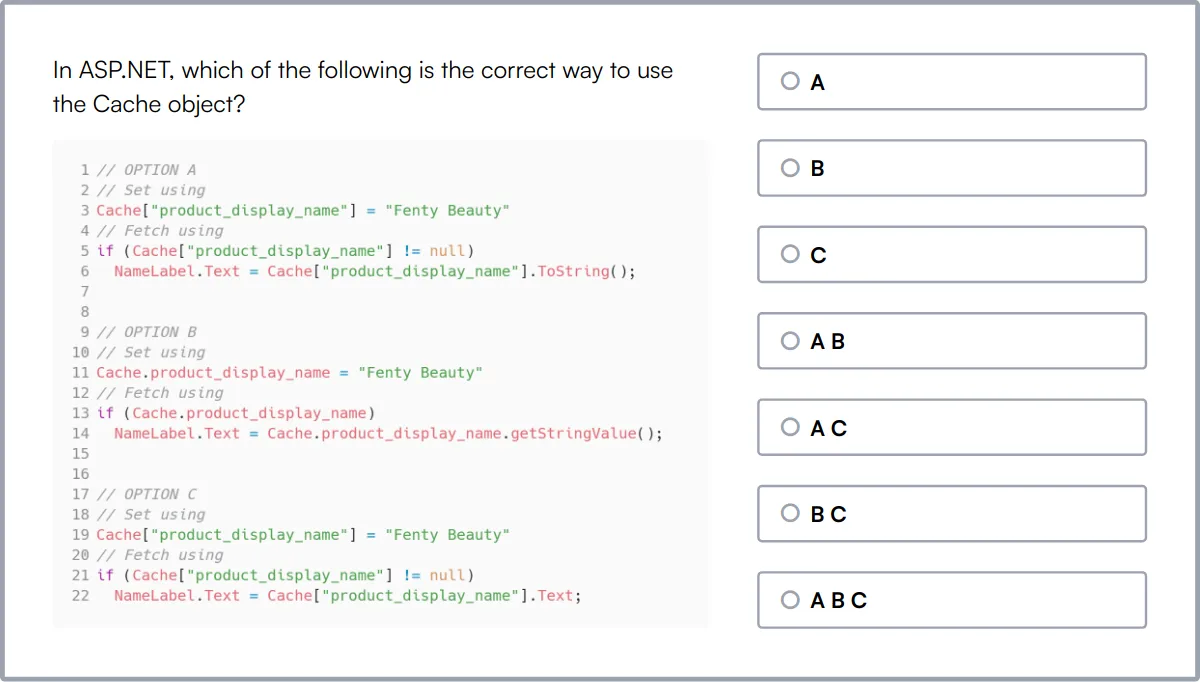
Entity Framework Online Test
Our Entity Framework Online Test assesses candidates on their ability to use Entity Framework for data-driven application development, focusing on ORM, LINQ, and performance tuning.
The test covers Entity Framework usage including entity states, transactions, query optimization, and database design. It evaluates how candidates handle data access layers and optimize database queries.
High-scoring candidates demonstrate expertise in managing complex data relationships and optimizing data access and performance in .NET applications.
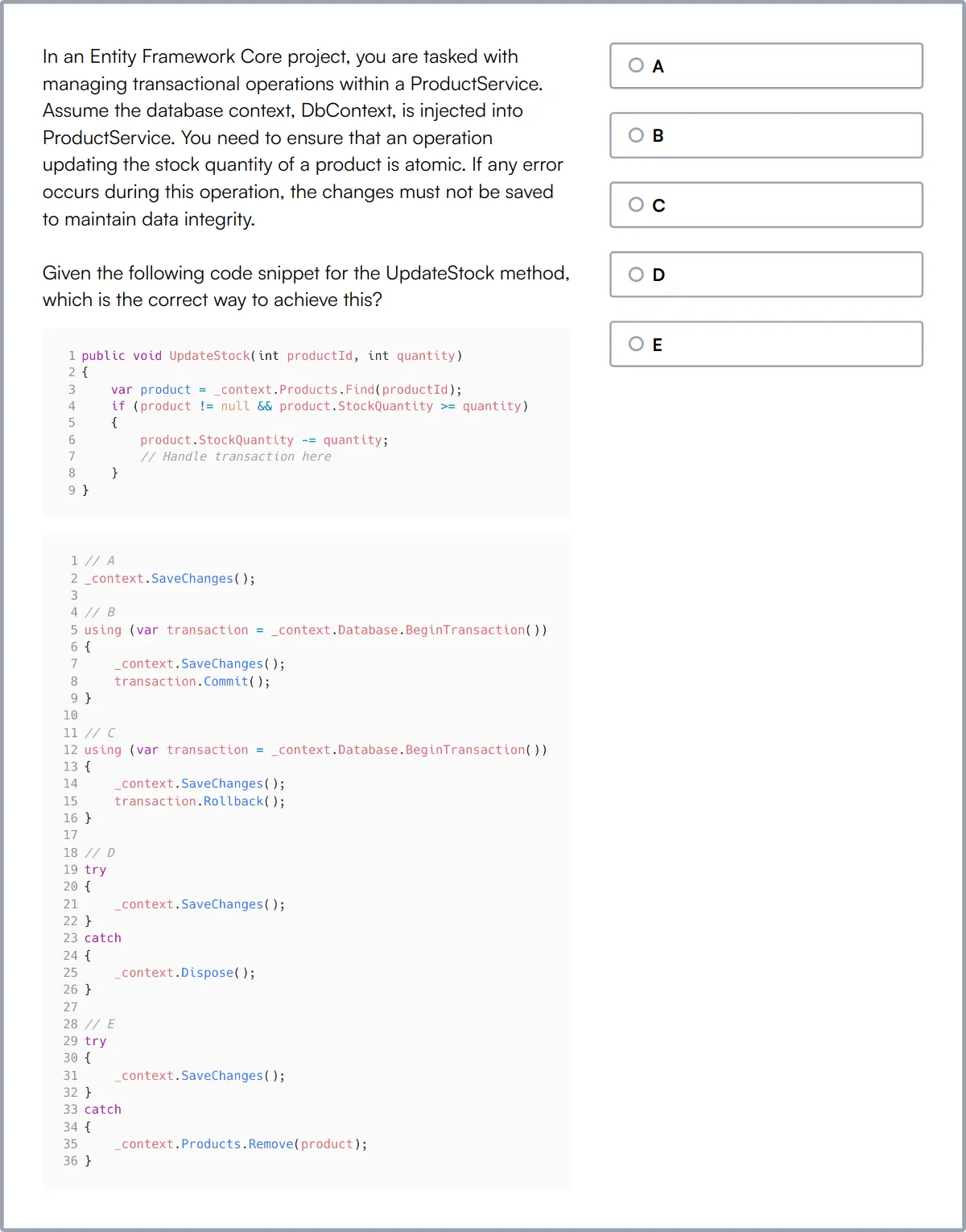
SQL Server Online Test
Our SQL Server Online Test evaluates candidates on their SQL Server management skills, including database administration, security, and performance optimization.
This test assesses knowledge in managing SQL Server environments, focusing on installation, maintenance, security, and troubleshooting. It also tests ability to write complex SQL queries and manage transaction logs.
Candidates who excel in this test are well-versed in SQL Server operations, ensuring data integrity and optimizing database performance under various conditions.
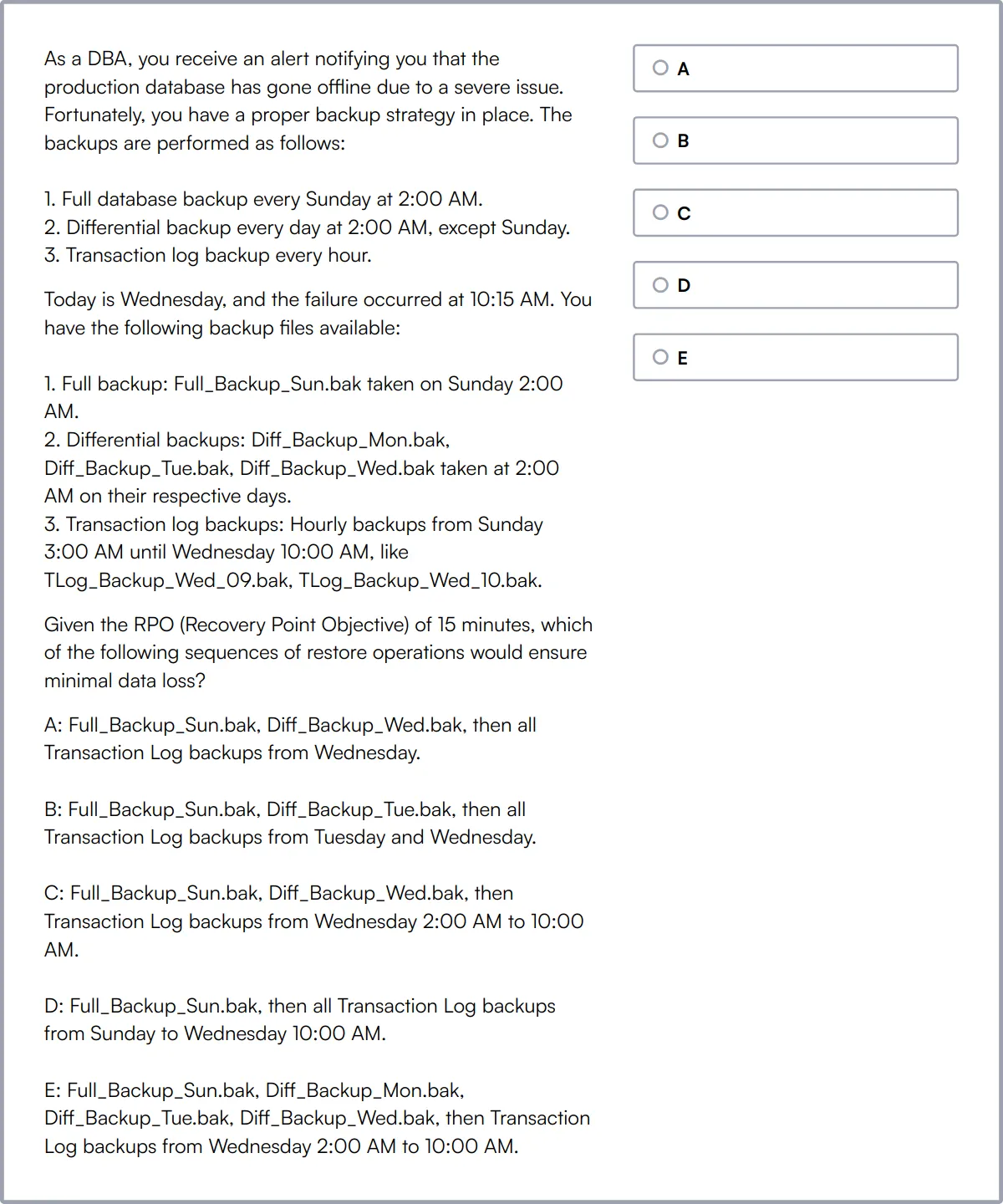
REST API Test
Our REST API Test gauges a candidate's ability to design and interact with RESTful APIs, focusing on API design, best practices, and backend service integration.
The test evaluates understanding of REST API principles, including HTTP methods, status codes, authentication, and API integration. It also includes a coding question to assess practical skills in API usage.
Successful candidates demonstrate a thorough understanding of REST API development and are capable of designing secure, scalable API solutions.
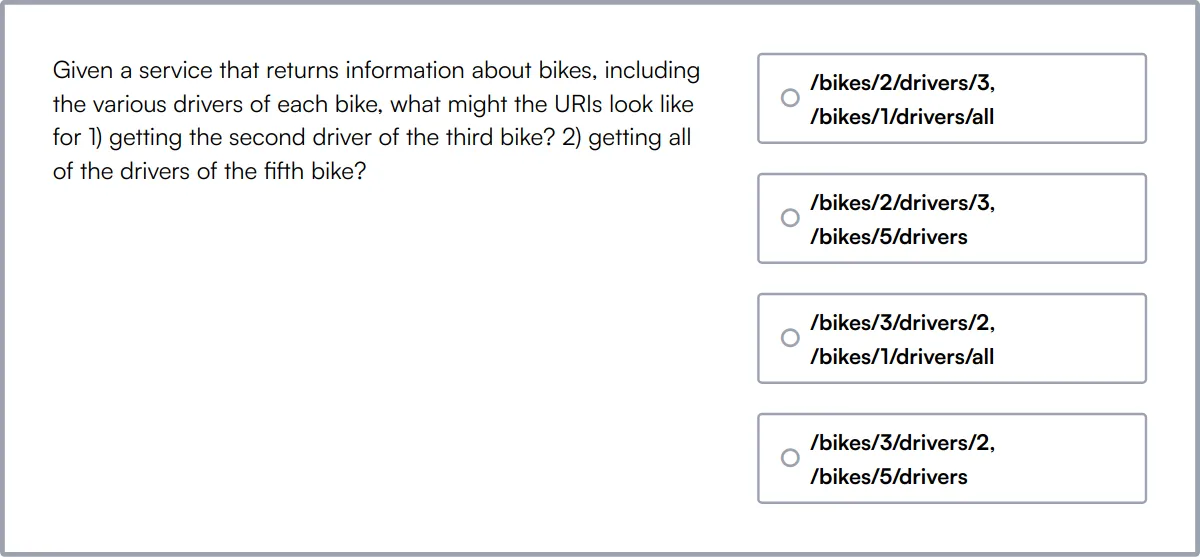
Git Online Test
Our Git Online Test assesses candidates on their proficiency with Git, covering repository management, branching, merging, and conflict resolution.
The test evaluates candidates' knowledge of Git commands, workflows, and branching models. It challenges them to demonstrate their ability to manage source code effectively in a collaborative environment.
Candidates who score well are proficient in using Git for version control, ensuring smooth and efficient team collaboration and code management.
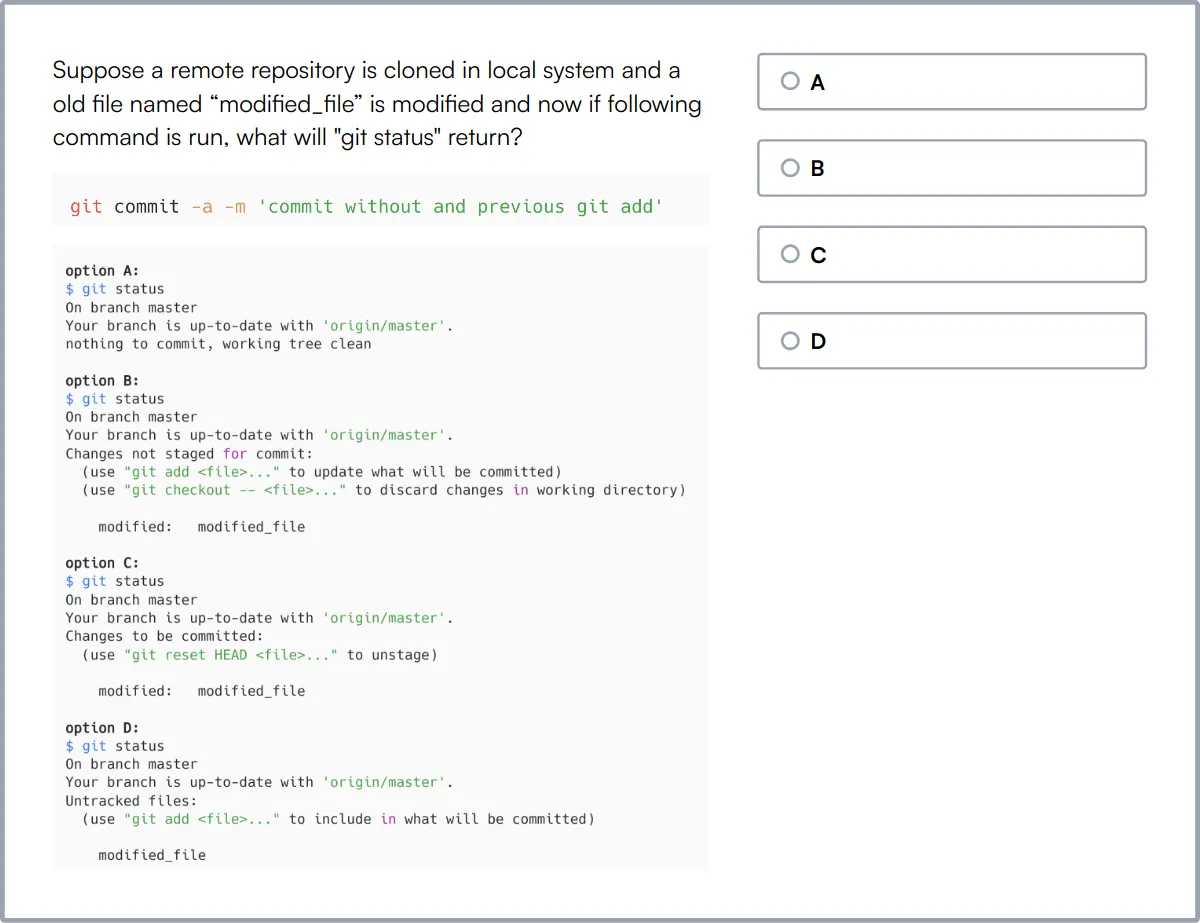
Summary: The 8 key Net Developer skills and how to test for them
| Net Developer skill | How to assess them |
|---|---|
| 1. C Sharp Proficiency | |
| 2. ASP.NET MVC | Assess the skill in building scalable web applications using ASP.NET MVC. |
| 3. Entity Framework | Check proficiency in managing data access with Entity Framework. |
| 4. SQL Server | Measure the ability to design and query databases using SQL Server. |
| 5. API Development | Evaluate skills in creating and consuming RESTful APIs. |
| 6. Version Control | Assess the ability to manage code versions using tools like Git. |
| 7. Debugging | Check the capability to identify and fix code issues. |
| 8. Unit Testing | Evaluate the ability to write and execute unit tests. |
.NET Online Test
Net Developer skills FAQs
What are the key skills required for a .NET Developer?
A .NET Developer should be proficient in C#, ASP.NET MVC, Entity Framework, and SQL Server. Additional skills include API development, JavaScript, Azure, and understanding of Agile methodologies.
How can recruiters assess C# proficiency in potential candidates?
Recruiters can assess C# proficiency through coding tests, reviewing past project contributions, and specific interview questions that explore understanding of C# concepts and problem-solving abilities.
What is the importance of ASP.NET MVC for a .NET Developer?
ASP.NET MVC is important as it allows developers to build scalable, dynamic websites and applications. It separates application logic, UI, and input control, facilitating clean and maintainable code.
Why is knowledge of Entity Framework beneficial for .NET Developers?
Entity Framework simplifies data access in applications, reducing the amount of code needed for data operations. It supports LINQ queries, change tracking, and updates, making data handling more efficient.
How does understanding Agile methodologies impact a .NET Developer's effectiveness?
Understanding Agile methodologies helps .NET Developers work in iterative sprints, adapt to changes quickly, and collaborate effectively with team members, leading to better project outcomes and faster delivery.
What tools can be used to evaluate a candidate's skills in API development and integration?
To evaluate API skills, recruiters can use technical assessments that include tasks like designing RESTful services, integrating with external APIs, and using Postman or similar tools for testing API endpoints.
How important is experience with Azure in the .NET development field?
Experience with Azure is increasingly important as many companies are moving to cloud-based solutions. Azure experience allows developers to build, deploy, and manage scalable applications more effectively.
What role do design patterns play in .NET development?
Design patterns provide standardized solutions to common problems in software design. For .NET Developers, understanding these patterns helps in creating more efficient, reusable, and maintainable code.
Assess and hire the best Net Developers with Adaface
Assessing and finding the best Net Developer is quick and easy when you use talent assessments. You can check out our product tour, sign up for our free plan to see talent assessments in action or view the demo here:

40 min skill tests.
No trick questions.
Accurate shortlisting.
We make it easy for you to find the best candidates in your pipeline with a 40 min skills test.
Try for freeRelated posts
Free resources



